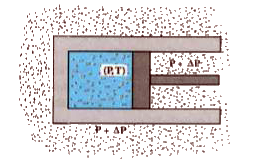Explain Quasi-static process.Solution in Gujrati
Suppose, the external pressure is suddenly reduced (by lifting the weight on the movable piston in the container).
So, piston will accelerate outward. During the process the gas passes through states that are not equilibrium states. The non-equilibrium states do not have well-defined pressure and temperature.
If the finite temperature difference exists between the gas and its surroundings there will be a rapid exchange of heat during which the gas will pass through non-equilibrium states and after some time the gas will settle to an equilibrium state.
An idealist process in which at every stage the system is an equilibrium state such process is infinitely slow. This process is known as Quasi-static process.
A quasi-static process is obviously a hypothetical construct. In practice, processes that are sufficiently slow and do not involve accelerated motion of the piston, large temperature gradient are approximation to an ideal quasi-static process.
The system changes its variables (P, T, V) so slowly that it remains in thermal and mechanical equilibrium with its surrounding throughout.
In a quasi-static process, at every stage the difference in the pressure of the system and the external pressure is infinitesimally small.
To take a gas from the state (P, T) to another state (P., T.) via a quasi-static process we change the external pressure change by a very small amount allow the system to equalise its pressure with that of the surrounding and continue the process infinitely slowly until the system achieves the pressure P..
Similarly to change the temperature we introduce an infinitesimal temperature difference between the system and the surrounding reservoirs and by choosing reservoirs of progressively different temperatures T to T., the system achieves the temperature T".

In a quasi-static process, the temperature of the surrounding reservoir and the external pressure differ only infinitesimally from the temperature and pressure of the system.
Topper's Solved these Questions
- THERMODYANMICS BOOK - KUMAR PRAKASHANCHAPTER - THERMODYANMICS EXERCISE - Section-A (Try Your self )
90 Videos
- THERMODYANMICS BOOK - KUMAR PRAKASHANCHAPTER - THERMODYANMICS EXERCISE - Section-B Numericals (Numerical From Textual Exercise)
10 Videos
- THERMAL PROPERTIES OF MATTERBOOK - KUMAR PRAKASHANCHAPTER - THERMAL PROPERTIES OF MATTEREXERCISE - Question Paper (Section - D) (Answer following in brief :) Each carry 4 marks
1 Videos
- UNITS AND MEASUREMENTBOOK - KUMAR PRAKASHANCHAPTER - UNITS AND MEASUREMENTEXERCISE - Section -F (Questions from Module )
20 Videos
Similar Questions
Which form of heat believed in before the modern time ?
View SolutionA geyser heats water flowing at the rate of 3.0 litres per minute from 27∘ C to 77∘C. If the geyser operates on a gas burner, what is the rate of consumption of the fuel if its heat of combustion is 4.0×104 J/g ?
View SolutionIn an experiment on the specific heat of a metal, a 0.20 kg block of the metal at 150∘C is dropped in a copper calorimeter (of water equivalent 0.025 kg) containing 150 cm3 of water at 27∘C. The final temperature is 40∘C. Compute the specific heat of the metal. If heat losses to the surroundings are not negligible, is your answer greater or smaller than the actual value for specific heat of the metal ?
View SolutionIf the error in measurement of radius of a shpere is 2% then the error in determination of volume of the sphere will be …………
View SolutionQUASI-STATIC PROCESS
View SolutionWrite a short note on Quasi-static process .
View SolutionWhat is an ideal quasi-static process ?
View SolutionDefine the quasi-static process.
View SolutionDefine the quasi-static process.
View SolutionWrite a note on quasi-static process.
View SolutionQuasi-static Process|Isobaric Process
View SolutionWhat is quasi-static ?
View SolutionGive the process which are quasi-static and do not dissipated energy.
View SolutionWhat is a quasi-static process? Briefly explain.
View SolutionAn ideal gas is allowed to expand at constant temperature in a quasi-static process. Can you reverse the process?
View Solution
